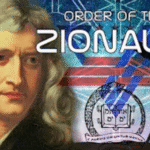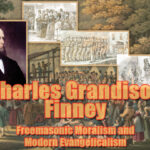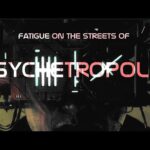“Traditional Bible-based Christianity is under attack in a systematic and insidious way in all parts of the world today. The tragedy is that most Christians do not seem to be aware of this… If believers allow themselves to be distracted or upset by all that the Enemy is doing, they could lose sight of the one task that really matters, namely spreading the Gospel.” – Jeremy James
Therefore, if anyone is in Christ, he is a new creation. The old has passed away; behold, the new has come. (2 Cor 5:14-17)
It’s disheartening that so few professing Christians today can see eye to eye. I remember a time when we might squabble over a second spiritual birth “evidenced by speaking in tongues,” but no one would have joined arms with Rabbis or anyone who either had a different story about who Jesus was or what He accomplished on the cross. No one talked about keeping Torah or felt the need to rally together to “usher in Messiah,” much less worried about the return of Fallen Angels who mixed their “seed” with humans and turned them into unredeemable mutants. Oh, there were different ways of worshipping Jesus; different songs, different dress codes, different worship styles, but although (what at the time seemed like) minor doctrinal differences, we all agreed that Christianity was about Jesus Christ dying in our place so that we could inherit eternal life.
Everyone is talking about “unity” today, but it’s a unity that comes at the expense of sound doctrine. And no wonder. Few believers are familiar enough with scripture to discern all the new false doctrines that are “tickling their itching ears.” (2 Tim 4:3-4) Appalled at the exponential rise of evil in the world, believers are not only joining arms with other denominations, but with worldly men who promise an earthly victory and a return to “normal” life (in this world). They forget that the Bible assumes evil in the world until Christ returns.
As the parade of wickedness diligently works to monopolize the few hours we have on this earth, I’m drawn to the letters to the churches in the book of Revelation, in particular the letter to the church at Ephesus.
I know your deeds, your labor, and your perseverance. I know that you cannot tolerate those who are evil, and you have tested and exposed as liars those who falsely claim to be apostles. Without growing weary, you have persevered and endured many things for the sake of My name
But I have this against you: You have abandoned your first love. (Rev 2:2-4)
Jesus!
The New Covenant (the Gospel) and the believer’s new identity in Christ Jesus has been under attack since the earliest days of the church. The devil has done everything in his power to keep the believer from the most wonderful truth the world has ever known: The miracle of New Spiritual Birth; the literal New Species now inhabiting this plane; the New Humanity (Eph 2:15) and His Spiritual Kingdom (Matt. 12:28) that reigns upon the earth!
Everywhere I look on the internet I see prideful believers who claim to have the “New World Order” all figured out. And they spout their conclusions like the Lord Himself had told them so. (1 Cor 4:6-7) But what if we figure out everything about Putin and the Ukraine and untangle their lies behind vaccine tyranny, nanotechnology and chemtrails? What if we learn to decode all their creepy signs and gematria and accurately predict who the antichrist is, if he’s a single man at all? What if we brilliantly sort it all out but miss the only thing that will matter when all these things have had their day and are nothing but a memory?
Yes, there is good reason to be aware of the days we’re in, but it isn’t to become the smartest conspiracy theorist. It is to avoid deception! But long before we even get to the deceptions of our time, indeed in order to get there, we need to have a firm grasp on the enormity of our salvation!
“What are you talking about Yvonne? I know the gospel: Jesus died to save our souls. We are helpless to gain eternal life without Him!”
Yes, thank you. That is true. But then what? Why are we still here?
“That’s easy; to tell others about Jesus!’
Also true! But what’s our motivation and what about when we fail? What about when we fall into (gasp!) sin? Why do we fall into sin? Can we lose our salvation if we don’t stop sinning? How do we know for sure we were saved in the first place?! The questions are endless. And the gospel should (and does) answer all of them. It does so by beginning with the one vital truth that, whether or not we realize it, we all wrestle with, and that’s our identity.
“My identity?”
Yes. Who are you?
“Me? Oh, I’m just a humble sinner saved by grace!”
You’re right that we are saved by grace, but scripture calls us a new creation (2 Cor 5:17), a royal priesthood , a holy nation, (1 Pet 2:9) It calls us saints! (Rom 1:7) beloved children of God! (1 Jn 3:1-3) In fact, scripture tells us that we no longer live at all (in the flesh that we once found our life in), but that it is Christ who lives through us! (Gal 2:20)
So then, why do we keep on sinning?
“Well, you know, I need to die to self daily, discipline myself to keep the old man under control!”
Which “self” is that? Your Old Man or Your New Man – Are you two people?
“Well, yes, sort of. There’s the ‘top door/bottom door of your heart’ and all that. It’s ‘positional’ truth. When we sin, God looks at us through the ‘filter’ of Christ.”
I’m sorry dear friend, but what scripture describes is much more radical than that! Consider Paul’s letter to the Christians in Rome.
For we know that the law is spiritual, but I am of the flesh, sold under sin. For I do not understand my own actions. For I do not do what I want, but I do the very thing I hate. Now if I do what I do not want, I agree with the law, that it is good. So now it is no longer I who do it, but sin that dwells within me. For I know that nothing good dwells in me, that is, in my flesh. For I have the desire to do what is right, but not the ability to carry it out. For I do not do the good I want, but the evil I do not want is what I keep on doing. Now if I do what I do not want, it is no longer I who do it, but sin that dwells within me.
So I find it to be a law that when I want to do right, evil lies close at hand. For I delight in the law of God, in my inner being, but I see in my members another law waging war against the law of my mind and making me captive to the law of sin that dwells in my members. Wretched man that I am! Who will deliver me from this body of death? Thanks be to God through Jesus Christ our Lord! So then, I myself serve the law of God with my mind, but with my flesh I serve the law of sin. (Rom 7:14-25)
If you read it too fast Roman’s chapter 7 almost sounds like double talk, but in answer to the question of whether there are two of you, Paul’s answer is a resounding no! Yes, you were a sinner when the only life you had was in the flesh. But what happened to you when you were convicted of your sin and found Jesus; what happened to you at the moment of salvation is so much more than saying a little prayer, “accepting Jesus into your heart” and “changing your citizenship!” Your very identity is now found in the spirit, which is now one with the very author of life itself! Paul is explaining that our truest personhood is now in the spirit. Any sinning that we do now is done in the flesh. And second Peter 1:9 tells us that the very reason that we fall into sin in the flesh is that we have forgotten about being forgiven, that we lose sight of the enormity of our salvation; that we forget who we are in Him.
In these dystopian times, as we’re surrounded by every wind of doctrine, an accurate grasp of the gospel of Jesus Christ and our identity in Him isn’t only important; it’s paramount. Everything else is secondary.
So, how are we saved and what actually happens to us when we are “born again??” I spent five years doing research for my book about Near Death Experiences, all in an impassioned attempt to present this one glorious truth. Following is a chapter.
***
Finding Freedom from Religion! | Glimpse Of Glory
By Yvonne Nachtigal
For the Christian religion began, let us never forget, not among brilliant, academic minds, not among the wealthy, or the powerful, or the brilliant, or the exciting, or the beautiful, or the fascinating; not among television personalities or leader-writers on the Guardian; it began among these very simple, illiterate people, and one was tremendously conscious of them gathered there.
– Malcom Muggeridge
It is my earnest conviction that we have dreadfully complicated what Christianity is all about. I’m not saying supplemental materials are without value… But I do wonder what complex, interlocking, systematic theologies were bouncing around in Peter’s mind on the Day of Pentecost and in those fresh, exciting years that followed. Were the epistles only meaningful after the theologians had opportunity to tear them apart and glue them back together?
-David Needham
As my research unraveled the thread of occult thought that had been woven into organized Christianity, rather than being shaken, my faith was strengthened. I became more determined than ever to be sure I had a solid grasp on the Gospel, and as I peeled back layer after layer of these erroneous teachings, I realized that God had given me that firm grasp many years ago and that it had been carrying me through my disillusionment with the organized church for a long time.
In 1986, I was in counselling dealing with a bout of depression and some issues from my childhood. My counselor, who was a pastor, gave me a copy of a book that explained the Gospel and my identity in Christ to me in a way I’d never heard before. The words in that book served to literally lift my depression and give me a sense of meaning, acceptance and purpose in my Christian life that I’d longed for. The book was Birthright: Christian Do You Know Who You Are? by Dr David C. Needham. Dr. Needham explained the importance of understanding who and what we are as believers in Christ.

Birthright became the subject of controversy because it challenged the well-established doctrine of “positional” righteousness – popularly understood as the “Christ Filter.” (If you ever want to get good and confused, try reading the volumes that have been written about “positional,” “imputed” and “infused” righteousness. Talk about complicating the Gospel!) Needham’s work is crucial in light of the false ideas that have been introduced into organized church doctrine that have led believers to focus on human effort (inward) and then to seek the experience they’re lacking as a result. I’ve decided to include lengthy passages from Birthright to help free us up from this popularly held concept.
To set this up a bit, up to this point in the book, Dr Needham had been talking about his own personal struggle between wanting to please God but fighting sinful desires. He pled with God for victory and joy and what God revealed to him set him free. Let’s turn to Dr. Needham as he reflects on the popular concept of “positional righteousness” or the “Christ filter”:
[L]et’s see if we can get a composite picture of the common, contemporary teaching on the spiritual life. To do this, let’s imagine God in all His absolute holiness at the very top of the picture. Then down at the bottom, let’s place me, a SINNER. Because I have received Christ, God has performed a remarkable thing. Since He obviously cannot associate with sinners – light cannot fellowship with darkness – He has inserted a miraculous filter between Himself and me, the sinner. That filter is Jesus. His death, His resurrection. Therefore, as God looks down on me, He doesn’t see me as I really am, but rather He sees all that is right about Jesus. Because of that wonderful filter, God’s record against me is wiped out. Everything I was and am, a sinner who sins, is completely erased. And further, everything that Jesus is has been written in place of that record. I am justified. I am “positionally” righteous. I am judicially righteous. This is the way God sees me. But if for a moment – horrible thought – that filter were not there and He saw me as I really am, He would call me what I am, a SINNER.
But God has done two other things. First, He has sent the Holy Spirit, the Comforter. Someone called alongside to help me, teach me, give me power. And secondly, God has given me a new nature. Therefore, though I am essentially a sinner, I do have this fresh capacity. So who am I? I am a SINNER with a new nature and the Holy Spirit.
Tragic Flaw
Praise God there is some solid truth in this picture. It is true that all my sins, past, present, and future, have been paid for by Jesus’ death. They are nowhere to be found in God’s records concerning me. And, praise God, I rest in the fact that there has been no dubious “book juggling” to bring this about. As an objective fact, all of Christ’s righteousness has been correctly credited to my account.
But there is one serious error – a tragic flaw. An error that pervades dozens of popular books on the Christian life. I wish I could shout these next lines around the world! A Christian is not simply a person who gets forgiveness, who gets to go to heaven, who gets the Holy Spirit, who gets a new nature. Mark this – a Christian is a person who has become someone he was not before. A Christian, in terms of his deepest identity, is a SAINT, a born child of God, a divine masterpiece, a child of light, a citizen of heaven. Not only positionally (true in the mind of God but not true in actuality here on earth), not only judicially (a matter of God’s moral bookkeeping), but ACTUALLY.
Becoming a Christian is not just getting something, no matter how wonderful that something may be.
It is becoming someone.
Only Saints Go to Heaven
Perhaps you are saying, “I thought that’s what everyone believed.” Most emphatically, it is not what everyone believes. In the deepest sense of personhood, if you have received Jesus Christ as Lord and Savior, you are not a sinner. You are righteous. But what “you” are we talking about? Not some ethereal, “positional” you. But that most fundamental you, that “you” which most deeply and eternally gives you authentic personhood. The “you” that goes to heaven someday. Forgiven sinners can never go to heaven; they would only dirty up the place. Only saints can go to heaven and you are a SAINT.”
Clearing away the fog of all the complicated doctrines that have been created by men in an effort to systematically define supernatural truth, what Dr. Needham went on to explain satisfied my yearning for “something more,” and for the first time in my spiritual walk, I experienced the joy of my salvation. Ensuing years of sitting under the various denominational teachings served to muddy it up a bit, but the essential understanding of my truest personhood in Christ has carried me through many difficult times. Now, in the midst of learning about the threads of deception in the church, it provided much needed clarity.
Needham points out how we commonly define ourselves in terms of: the things we do, our talents, skills, looks, family of origin, place of birth, hopes and dreams, and he challenges us to ask ourselves, when those things are taken away from us – who are we then? As the caterpillar in the story of Alice in Wonderland asked over and over again,
“Who ARE you?”
It’s an important question.
Who are you in the deepest level of your personhood? Christians might be quick to answer, “Oh, I’m just a sinner saved by grace!” And in a sense, that’s true. We were all sinners, and apart from Jesus Christ it is all we would ever be.
What exactly is sin anyway?
“Well, it’s rebellion against God! The bible has a list of commandments. If we break them, that’s sin!”
Yes, God gave Moses His laws, but is sin just breaking a rule? Why do we have such a hard time with the rules? Why is there such a universal desire to do bad things? And what about the gnawing emptiness we deal with that has inspired all the world religions?
Dr. Needham offers a fresh definition of sin that recognizes man’s longing for meaning at its essence:
“Sin is the expression of man’s struggle with the meaning of his existence while missing life from God. It is all the varieties of ways man deals with and expresses his alienation from his Creator as he encounters the inescapable issue of meaning…
What really happened in the Garden of Eden? Adam and Eve lost life. At least part of what Satan told them would happen, happened. They became independent creatures, cut off from the presence of God. Cut off from His mind, His perfection, His purity, His LIFE. Life for them after the fall had to be found within themselves. It was in this tragic sense that they became ‘like God.’
“Flesh,” that is, everything mortal about them, became very important. Of course it was important – it was all they had. Brains, emotions, senses, creativity, imagination, bodies. Life was here, in the flesh. It was nowhere else.”
Adam and Eve had been created with dominion over the earth and as a result of their sin, they were now mortal. Through their sin, a curse fell over all creation so that it too was
subjected to frustration (aimlessness / futility). (Romans 8:20)
Awareness of their futility was heard in the shout of the crowds as they erected the tower of Babel.
Let us make a name for ourselves! (Genesis 11:4)
It was echoed in the words,
everyone did as he saw fit (Judges 17:6, 21:25).
Perhaps Solomon gave it its most eloquent expression when he cried:
Meaningless! Meaningless! … Everything is meaningless! (Ecc 12:8)
Thousands of years later, “after countless gallons of human tears,”
No one has “ascended.”
No one has satisfactorily explained why we are here.
No one has conquered death – except Jesus Christ.
Yet the majority of the world still maintains that Adam made the right decision. Needham writes,
“Even as I swallow my tranquilizers, rush to my psychiatrist, take that extra drink, endure my third divorce, and watch my children reject all the ideals I have tried to pass on – I still say there is hope!”
This is echoed by the prophet Isaiah,
You were wearied by all your ways, but you would not say, ‘It is hopeless.’ You found renewal of your strength, and so you did not faint. (Isaiah 57:10)
Earlier we looked at how the cycle of suffering, “tana” to Kabbalists, Hindus, Buddhists, Stoics and others, was the result of “samsara,” or unwholesome behaviors, and how religious practice promises to free man from those things. In the Bible, we see these unwholesome behaviors and the pain they cause described as “the deeds of the flesh.”
Now the deeds of the flesh are evident, which are immorality, sensuality, idolatry, sorcery, disputes, dissensions, factions, envyings, drunkenness, carousings, and things like these… (Galatians 5:19-21)
No amount of religious practice or discipline has ever victoriously overcome this tendency (sin) or the pain it causes nor has it answered the deeper, underlying problem. Professor Needham explains that these deeds are actually the attempts of the fallen soul to find meaning apart from God:
“The first three “deeds,” immorality, impurity, and sensuality, obviously relate to man’s attempts to find meaning through his physical body – his glands and senses and fantasies. Idolatry is very broad. An idolator is someone who has made up his mind on where and how he will find life. And whatever it is, he will work feverishly to get it, guard it, sacrifice to it, and worship it. To lose it is to lose life.
Sorcery focuses on the search for meaning in the occult. Enmities, strife jealousy and outbursts of anger reflect the standard reactions of someone who is frustrated with a given set of circumstances. Either some supposed meaning in life has been taken from him, or threatened, or has been kept just beyond his reach.
Disputes, dissensions, and factions point to conflicting ideologies about where life really is – where people’s values are. Envyings is clear enough. Someone else has “made it,” and I want it.
The final two “deeds,” drunkenness and carousing, are evidence that I have given up.
I have no will to seek meaning anymore.
I’ve tried and tried to make some sense out of life.
I’m through trying.
I want out…”
So, then, sin is much more ruthless than just breaking a rule, doing the wrong thing, or the neat Christian definition of “missing the mark.” It is the:
empty way of life…futility of their thinking…they walked after emptiness and became empty. (Peter 1:18; Ephesians 4:17; Jeremiah 2:5.)
Sin is the utter madness of trying to find meaning and purpose in an existence in which there can be no lasting significance.
So then, where IS meaning and purpose found?
It is found in returning to what we were created for. Needham explains that,
“God’s purpose in creating us is so that we, through a dependent fellowship with our God, could receive and display the very life of God – the glory of God.”
Dear believer, don’t rush past that! Reread it slowly and let it sink in for a minute!
We find the key of how to find this fellowship in Paul’s letter to the Ephesians. Paul prays for believers to grasp the miracle of their identity in Christ. Here is Dr. Needham’s breakdown of this prayer. I’ll put it on the next page so it’s all in one place and you can read uninterrupted.
For this reason
I bow my knees before the Father,
from whom every family
in heaven and on earth
derives its name,
I pray that out of his glorious riches
He may strengthen you with power
through his Spirit
in your inner being.
so that Christ may dwell in your hearts
through faith.
And I pray that you, being rooted and established in love,
may have power, together with all the saints,
to grasp how wide
and long
and high
and deep
is the love of Christ,
and to know this love
that surpasses knowledge –
that you may be filled to the measure of all the fullness of God,
Now to him who is able to do
immeasurably more
than all we ask of imagine,
according to his power that is at work within us,
to him be glory throughout all generations, for ever and ever!
in the church and
in Christ Jesus,
Amen.
(Ephesians 3:14-19)
Can you imagine any better definition of holiness than to “be filled to the measure of all the fullness of God?” I can’t…
Dr. Needham goes on to point out five ingredients in Paul’s prayer that result in practical, experiential holiness in a believer’s life.
An awareness of one’s identity and meaning in life. Paul begins his prayer with a solid awareness of truest self-identity, “in your inner being,” that deepest realm of human personhood which will someday grace heaven itself and which alone is equipped by God to express authentic meaning in life (which, by the way, is the essence of the entire prayer). Next, let’s notice the final three ingredients.
The unconditional issue of Lordship. Paul begins with absolute submission to the Father, “I kneel before the Father.” He then concludes his prayer with absolute commitment to the glory of God, “to Him be the glory!” And in between he acknowledges the fundamental necessity of Christ dwelling in our hearts. Interestingly, the word Paul chose for “dwell” literally means “to be at home in.” In other words, there can be no practical holiness unless Christ is truly “at home” in your life. That’s Lordship.
The Holy Spirit’s presence and power as an experienced reality. “Strengthen you with the power through his Spirit.” Could that possibly be non-experiential? Not a chance! Why? Because the presence of that power will produce in you (1) spiritual comprehension with dimensions beyond your dreams, and (2) an awareness of the love of Christ which “surpasses knowledge.”
A body life participation rather than an isolated pilgrim. “Being rooted and established in love, may have power, together with all the saints…to him be glory in the church.” If this were not enough, the next three chapters which flow out of this prayer are packed with relational issues with love at the center.
Now, back to that second one. Holiness demands active participation of the will. Fundamental in this prayer is the earnest, fervent asking by Paul. Not only for others, but certainly we should assume for himself also. One more word in this prayer spotlights the will. It’s the word “faith.” It is through faith that the fullness of God is received. And faith is an action word – solid commitment, firm expectation. There can be no holiness apart from the exercise of your will – in asking God and believing God!
“Above All We Ask or Imagine…”
That indeed is a remarkable prayer, but it doesn’t stop with verse 19. As if to underline the scope and mystery of his request, Paul adds verse 20. This God to whom he prays “is able to do immeasurably more than all we ask of imagine.”
What a GLARING contrast to what legalism / law teaches! These verses do not say that we become filled with the fullness of God through doing good works! The focus is on God, not human effort!
For what the Law could not do, weak as it was through the flesh, God did, sending his own Son in the likeness of sinful flesh and as an offering for sin, he condemned sin in the flesh, so that the requirement of the Law might be fulfilled in us, who do not walk according to the flesh but according to the Spirit. For those who are according to the flesh set their minds on the things of the flesh, but those who are according to the Spirit, the things of the Spirit. (Romans 8:3)
God knew when He implemented the law that following it could never restore man, but gave it, along with the various covenants in the Old Testament, as a “shadow” of things to come (Christ and the New Covenant in Him). The law, in and of itself, without understanding its purpose (to reveal our sin, futility and desperate need for God to save us), and its prophetic nature – in that it pointed to Jesus who fulfilled it– only produces the false hope that, “We’ve got this. We can solve this problem on our own!” But that’s a lie. Following the law cannot save us. It was never meant to.
For by works of the law no human being will be justified in his sight, since through the law comes knowledge of sin. (Romans 3:20)
It is not by chance that so much work has gone into confusing the nature of sin, its remedy and Christian’s identity. Knowing who we are in Christ strengthens us against spiritual deception.
Dear Christian: We are named for Him! That is identity! And it is as we are rooted and grounded in His love and strengthened by his Holy Spirit to comprehend that love which surpasses knowledge, that we are filled with all the fullness of God! That, NOT occult inspired mystical experience, is true, experiential, spiritual life!
If that does not appeal to you, and you are finding your identity in religious practice, relationships, vocation, position, talents, paycheck or worldly possessions, I gently suggest to you that are missing true life – He has so much more for you! If you are trying to be “extra-holy” by following the law better than the next person or saying his name some special way so that He will hear you better, dear believer you have been sold a bill of goods and are misunderstanding the miracle of His salvation. If you are running off to every conference or “renewal” weekend trying to “experience” your Christianity, you have rushed past all that you already have in Him. He is with you right here and now, inviting you into His presence!
Come to me, all you who are weary and burdened, and I will give you rest. Take my yoke upon you and learn from me, for I am gentle and humble in heart, and you will find rest for your souls. For my yoke is easy and my burden is light. (Matthew 11:28-30)
I can’t think of a book I would more highly recommend to help a believer better understand his identity in Christ than Birthright: Christian Do You Know Who You Are? by David C. Needham. The revised version is available online, but my favorite is still the original version (with a flower on the front cover) which you can find at an online used book outlet.
Quotes taken from: Birthright: Christian, Do You Know Who You Are? by David C. Needham










